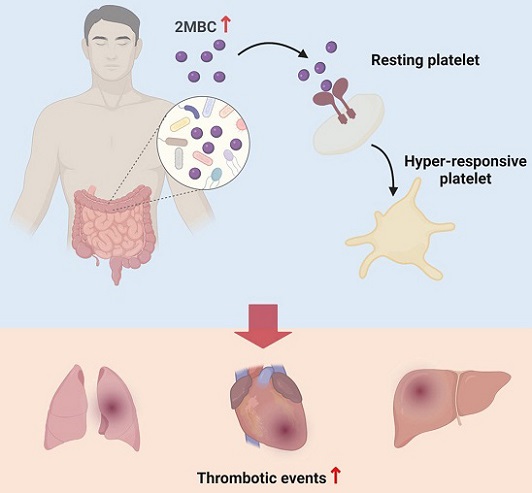A Gut Microbial Metabolite Called 2-Methylbutyrylcarnitine Causes COVID-19 Individuals To Have Higher Risk Of Blood Clot!
Nikhil Prasad Fact checked by:Thailand Medical News Team Feb 26, 2024 1 year, 1 month, 2 weeks, 5 days, 16 hours, 10 minutes ago
COVID-19 News: The intricate relationship between the gut microbiome and human health has been a subject of extensive research, with recent findings shedding light on the role of gut microbial metabolites in various physiological processes. A recent study covered in this
COVID-19 News report by researchers from Sun Yat-Sen University, Guangzhou-China and Guangzhou Medical University-China has uncovered a compelling link between a specific gut microbial metabolite, 2-methylbutyrylcarnitine (2MBC), and the heightened risk of thrombosis in individuals with COVID-19. Thrombosis, the formation of blood clots, is a critical factor in major adverse cardiovascular events (MACE), including heart attacks and strokes. This article explores the details of this groundbreaking study, providing insights into the mechanisms by which 2MBC exacerbates thrombotic risk in COVID-19 patients.
 Gut Microbial Metabolite Called 2-Methylbutyrylcarnitine Causes COVID-19 Individuals To Have Higher Risk Of Blood Clot
Background: Gut Microbiota Dysbiosis and Thrombosis
Gut Microbial Metabolite Called 2-Methylbutyrylcarnitine Causes COVID-19 Individuals To Have Higher Risk Of Blood Clot
Background: Gut Microbiota Dysbiosis and Thrombosis
The association between gut microbiota dysbiosis and an increased risk of thrombosis has been a subject of interest in scientific circles. Previous studies have demonstrated that metabolites derived from the gut microbiota can influence platelet activity and contribute to cardiovascular diseases. Despite extensive documentation of gut microbiota dysbiosis in patients with COVID-19 and metabolic disorders associated with elevated thrombotic risk, the precise causal link and underlying mechanisms have remained elusive.
The Study's Approach
To bridge this gap in knowledge, a collaborative effort led by co-senior study authors Dr Sifan Chen, Dr Meng Ren, and Dr Linghua Li from Sun Yat-Sen University and Guangzhou Medical University embarked on a comprehensive investigation. Employing multi-metabolomic analyses, the researchers identified 2MBC as a crucial metabolite linking gut microbiota dysbiosis to heightened thrombotic risk.
Understanding 2MBC and its Accumulation
2MBC belongs to the category of short branched chain acylcarnitines, compounds previously associated with metabolic disorders such as obesity, diabetes, non-alcoholic steatohepatitis, and hypertension. The study involved a cohort of 64 COVID-19 patients, 12 healthy individuals, and 12 non-COVID-19 hospitalized subjects. The results revealed a significant accumulation of 2MBC in patients with COVID-19 and those with MACE. Importantly, the elevated levels of 2MBC persisted even after the clearance of the virus in COVID-19 patients, suggesting a lingering impact on thrombotic risk.
Insights from Animal Studies
To delve deeper into the mechanistic aspects, the researchers conducted experiments using mice. The findings indicated that 2MBC played a role in promoting platelet hyperreactivity and thrombus formation in mice. Intriguingly, the administration of an antibiotic cocktail to eliminate gut microbiota in mice resulted in a substantial
reduction in both plasma 2MBC levels and the heightened tendency for thrombosis following SARS-CoV-2 infection.
Unveiling 2MBC's Signaling Mechanism
The study further elucidated the signaling mechanism through which 2MBC contributes to heightened thrombotic risk. In a series of experiments, it was revealed that 2MBC binds to a specific receptor called integrin α2β1 in platelets. This binding potentiates platelet hyperresponsiveness, a crucial factor in thrombus formation. Integrins, acting as surface receptors, mediate interactions between cells and play a pivotal role in various cellular processes.
Addressing the Causal Link: Integrin α2β1 Inhibition
To solidify the causal link, the researchers explored the effects of genetic depletion and pharmacological inhibition of integrin α2β1. These interventions were found to be effective in ameliorating the heightened thrombotic potential induced by 2MBC. This discovery not only highlights integrin α2β1 as a cellular target for 2MBC but also suggests a potential therapeutic avenue for mitigating thrombotic risk in individuals with elevated levels of this gut microbial metabolite.
Implications for Metabolic Disorders
While the study primarily focused on the association between 2MBC and thrombotic risk in COVID-19 patients, the authors propose that the findings may extend to other metabolic disorders such as obesity and diabetes. This implies that 2MBC could be a previously unrecognized driving factor for increased thrombotic potential in these conditions, beyond traditional risk factors.
Conclusion and Future Implications
In summary, the study provides crucial mechanistic insights into the role of the gut microbial metabolite 2MBC in exacerbating thrombotic risk, particularly in individuals with COVID-19. By uncovering the signaling pathway involving integrin α2β1, the researchers have identified a potential therapeutic target for mitigating thrombotic risk associated with 2MBC accumulation. Moreover, the study suggests that the implications of 2MBC may extend beyond COVID-19 to encompass a broader spectrum of metabolic disorders. Future research in this area holds the promise of developing targeted interventions to modulate gut microbial metabolites and reduce the risk of thrombosis in vulnerable populations.
The study findings were published in the peer reviewed journal: Cell Metabolism on February 23
rd 2024.
https://www.cell.com/cell-metabolism/abstract/S1550-4131(24)00014-7
For the latest
COVID-19 News, keep on logging to Thailand Medical News.
